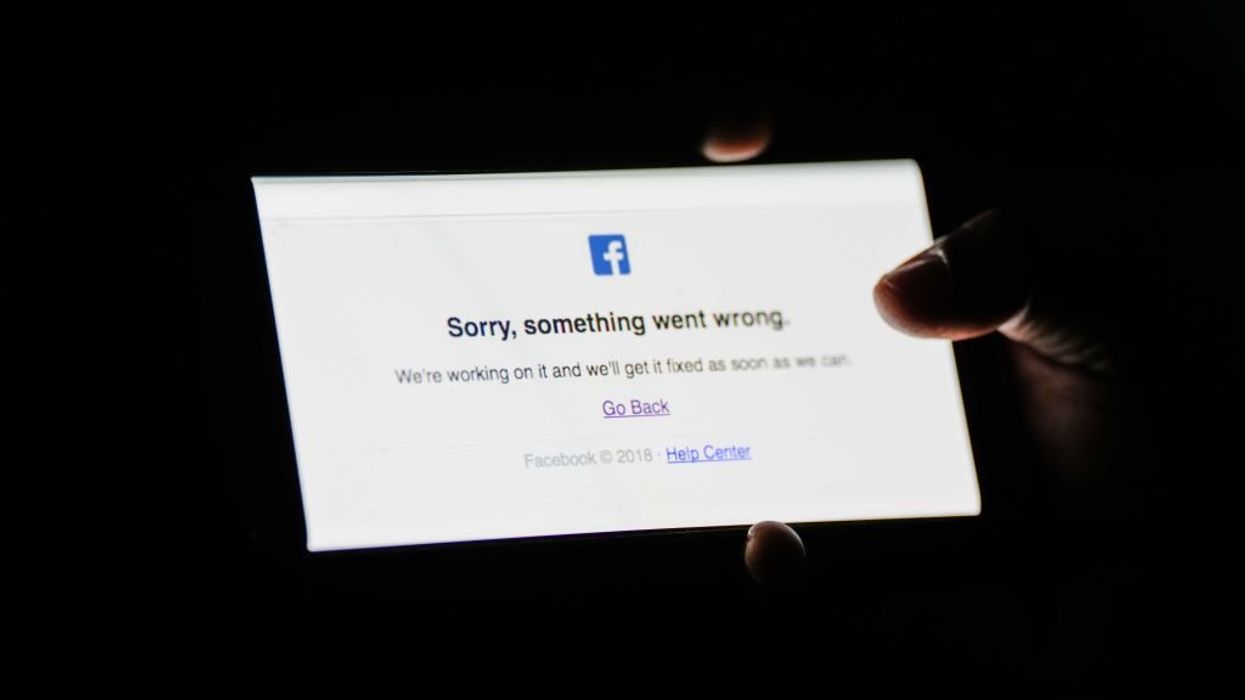
Thilina Kaluthotage/NurPhoto/Getty Images

Facebook’s effort to suppress political speech only makes sense if keeping Donald Trump out of the White House is the goal.
It's beyond coincidental that on Super Tuesday, when a third of the United States held a presidential primary, two of the world’s largest and most influential social media platforms went down. Facebook and Instagram motivate and sway voters. When taken in conjunction with Meta’s recent ban on “political posts,” it’s hard to believe last week’s hours-long outage was not a trial run for November.
With its nearly unlimited reach, social media has become the most important platform for politicians to advance their messages. Presidential election years are by far the most important — and most lucrative — for social media companies. Hundreds of millions of dollars are at stake. And that’s just for the political ads.
The last two presidential elections were shot through with fraud. The 2024 election year may be the worst yet.
But ads are not where the money blitz begins and ends. Think of all the news shows, podcasts, and influencer posts, and the increase in content views due to peaked user interest during an election year. Now, think of the ads inserted in videos and on influencers' pages. The revenues can easily reach the billions, depending on the platform.
Now, here’s the trouble. In recent years, we’ve learned how Facebook and Twitter (now X) actively engaged in election interference and censorship. In fact, censorship is the mark for election interference, and we’ve seen this for a decade as conservative voices have been “shadowbanned” or throttled.
Election years are when the censorship goes into overdrive. We’ve seen the Twitter Files, which exposed how the company worked hand-in-glove with federal authorities, including the FBI and CDC, to suppress disfavored views.
We’ve seen the bans of only prominent, conservative handles for posts that “go against standards.”
We've seen even the smallest accounts get banned for posting opinions that ran afoul of the platform narrative.
We've seen and heard in congressional testimony that Facebook’s “fact checkers” are simply opinion checkers and have free rein to flag any posts they see fit.
We saw Facebook and Twitter suppress the Hunter Biden laptop story that broke right before the 2020 election and most certainly would have undermined Joe Biden's chances of winning a free and fair election.
All of these are classic forms of election interference.
Recently, Meta, which includes Facebook, Instagram, and Threads, issued a ban on “political content.” This is truly puzzling as the company did not clearly define what “political content” is, or whether the ban extends to political advertising. As head of a publicly traded company, Mark Zuckerberg has a fiduciary responsibility to do the best he can for his shareholders. Surely then, he would not turn down hundreds of millions of dollars in annual revenue for political ads would he? Whose interest would that serve, if not Meta’s shareholders?
Election years offer alternative social media platforms the chance to exploit earning possibilities. Some better than others. In a move sure to alienate users, Gab, which is popular among some conservatives for its unfettered speech, went to a paid model without much warning. Many users logged in one day to learn they would need to pay $9.99 a month for the privilege of posting any picture, meme, graphic, or video. Businesses would pay more — from $99.99 up to $499.99 a month. Whether it is desperation or trying to capitalize on the election year, the move is a risky and potentially fatal one for Gab.
As the cliché goes, this is the most important election of our lifetimes. The last two presidential elections were shot through with fraud. The 2024 election year may be the worst yet, and it’s all being advanced by corporate media, politicians, and Big Tech. The left has never been more desperate and will do anything to thwart Donald Trump from retaking office. Big Tech social media is the left's number one weapon and biggest asset in their arsenal of fraud.
Democracy is undermined and attacked when Americans’ First Amendment rights are suppressed. You are under attack. Every thought Americans have can be affected and opinions swayed to match the Big Tech social media narrative. This is why I founded Wimkin Social Media, a true alternative to Facebook with nearly all the same features, that provides true freedom of speech. We’ve beaten app store bans, cancellations by banks, infrastructure providers, and mainstream media attacks. Even the House Select Committee on January 6 tried and failed to shut us down. I hope you will join me and our millions of patriots there who understand that every moment spent on Big Tech social media is a moment your freedoms are under attack.
Together, through awareness and truth, we can take our country back.
Jason Sheppard